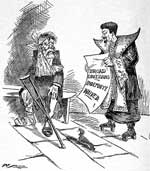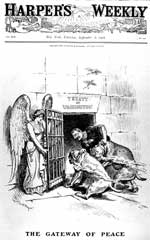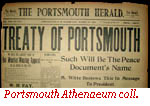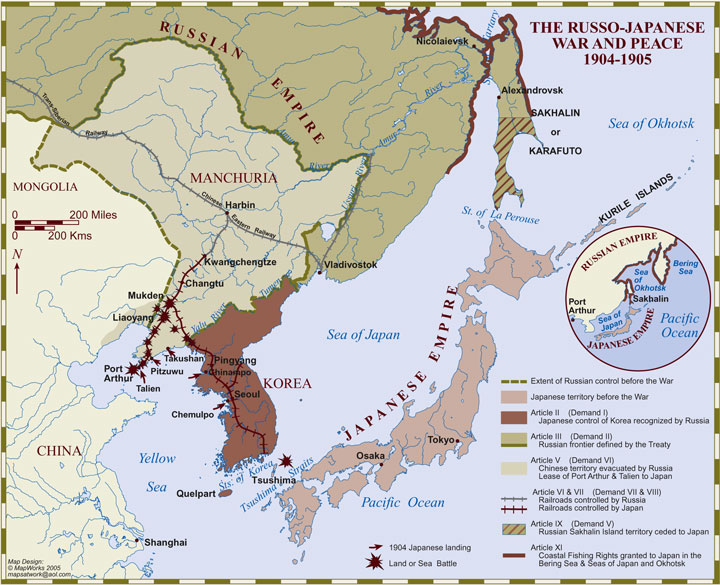
After all the business in the conference room had been concluded, we were invited to a daintily prepared lunch in another apartment. Here the greatest good fellowship prevailed. Toasts were drunk to Russia, Japan, the members of the embassies, to Portsmouth and to a great number of other persons and places.
-- Portsmouth Mayor William Marvin
August 29, Tuesday: Peace

Japanese government's decision to make concessions on Sakhalin Island and the indemnity secured the peace agreement. Harper's Weekly. View larger image.
 On August 29, as Komura and his party left the hotel for the Navy Yard, he was heard to say, “Today is Minatogawa,” referring to a tragic 1336 battle in which a loyal samurai, knowing he wouldn’t prevail, sacrificed his life by leading his forces against anti-imperial rebels. Komura was opposed to giving into the Russians on no indemnity and one-half of Sakhalin but he loyally accepted his government’s position, knowing that he would receive the blame from many Japanese politicians and the Japanese people. However, he was not sure of Witte’s position, and he had his orders to make certain he got one-half of Sakhalin.
On August 29, as Komura and his party left the hotel for the Navy Yard, he was heard to say, “Today is Minatogawa,” referring to a tragic 1336 battle in which a loyal samurai, knowing he wouldn’t prevail, sacrificed his life by leading his forces against anti-imperial rebels. Komura was opposed to giving into the Russians on no indemnity and one-half of Sakhalin but he loyally accepted his government’s position, knowing that he would receive the blame from many Japanese politicians and the Japanese people. However, he was not sure of Witte’s position, and he had his orders to make certain he got one-half of Sakhalin.
Witte also had his orders to make no concessions and end the talks. The parties met at the Shipyard at 10:00 a.m. first in private in an informal session to determine the final situation. Witte told Komura that the Tsar had formally rejected his previous offer of a compromise. Komura then said the Japanese would drop the indemnity if Russia would cede all of Sakhalin to them. Witte again declined the offer. For a few moments no one spoke and the room was filled with tension. Komura, then realizing that Russia would concede nothing else and that he would have to make the proposal that would result in peace, made his final offer. If Japan dropped its demand for indemnity, Komura asked, would Russia give up half of the island? The reply was yes. The agreement was reached.
The parties then moved to the formal session at 10:55 a.m. where the scenario was formally repeated with Komura repeating the offers and Witte making no concessions, but finally agreeing to Komura’s offer of one-half of Sakhalin. Peace in principle was achieved. Witte wanted to leave the peace details to later negotiations, but Komura insisted on settling every last detail of the dispute and cessation of hostilities. In the formal morning session the parties then dealt with problems with the cession of Sakhalin and agreed on Demand V (Treaty Article IX), withdrawal of troops from Manchuria, and the point of demarcation between the Russian and Japanese railways in Manchuria. The session ended at 12:30 p.m. Komura had calmly notified Secretary Peirce of the agreement at 12:00 and asked him to first inform Roosevelt. Most of the delegates ate at the shipyard, but Witte left for lunch at the Wentworth where, by the time he reached the hotel, the crowd was wild with joy as men threw their hats aloft and women actually wept at the news. Witte became overcome with emotion and claimed diplomatic victory by saying the Russians had paid not one sous.
When Secretary Peirce notified Portsmouth Mayor William E. Marvin of the agreement, the mayor ordered the bells of the city rung for half an hour, from 4:00 - 4:30 p.m., a tribute previously accorded only at the end of the Civil War. Japanese and Russian flags were unfurled both from the Rockingham and the Young Men’s Christian Association building on Congress Street in Portsmouth.
Witte returned to the Shipyard at 3:00 p.m. and the formal negotiations resumed to deal with agreements on exchange of prisoners of war, treaty of commerce, linking of railways, and the exchange of ratification. The session adjourned at 5:00 p.m. Both sets of delegates were cheered as they drove back through the city and they received a roaring welcome from guests and staff at the Wentworth. Witte was so overcome with emotion he had difficulty maintaining his composure while Komura was seen to smile, in fact laugh, for the first time since his arrival in Portsmouth.

There were many differences of opinion as to the treaty's formal name. Harper's Weekly, Sept. 1905. View larger image.
 In a front-page headlined “Treaty of Portsmouth,” the Herald seemed to have had the final word on a subject that had been bothering most local people. Witte wired Roosevelt: “I extend to you my hearty thanks for your humane efforts upon peace and the Treaty of Portsmouth, N.H.”
In a front-page headlined “Treaty of Portsmouth,” the Herald seemed to have had the final word on a subject that had been bothering most local people. Witte wired Roosevelt: “I extend to you my hearty thanks for your humane efforts upon peace and the Treaty of Portsmouth, N.H.”
Witte immediately telegrammed the Tsar with the news good and the next day received a response from Nicholas that only ordered him not to sign the treaty if the size of the payment for the care of war prisoners was not established. Nicholas did not express his thanks for Witte’s efforts. For Witte the days until the treaty was signed were uneasy. He feared that Nicholas might again change his mind and he considered that the Japanese might do the same.
 That evening some Russians dined with Assistant Secretary Peirce. Later there was a cinema and banquet at the Wentworth where both Russian and Japanese envoys viewed moving pictures of their stay.
That evening some Russians dined with Assistant Secretary Peirce. Later there was a cinema and banquet at the Wentworth where both Russian and Japanese envoys viewed moving pictures of their stay.

